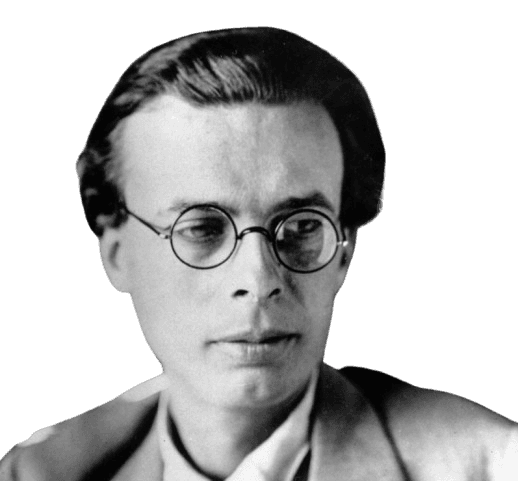Life and achievements
Early life
Aldous Leonard Huxley was born on 26 July 1894 in Godalming, Surrey, England. He was the third son of Leonard Huxley, a writer and teacher, and Julia Arnold, who started Prior's Field School for Girls. Huxley's family background can be traced back to his grandfather, Thomas Henry Huxley, a famous biologist known as 'Darwin's Bulldog.' His early childhood was characterized by drawing, and he was nicknamed "Ogie," which is short for "Ogre." His early education was at home, but he later attended Hillside School and Eton College. He lost his mother at the age of 14 and had an eye ailment that almost blinded him at the age of 20. These events led to the demise of his dream of becoming a doctor, and instead, he was to take a path toward literature.
Although almost blind, Huxley was admitted to Balliol College, Oxford, where he did well in English literature. He also edited the Oxford Poetry while at Oxford and graduated with first-class honors. His poor vision disadvantaged him in society but did not stop him from pursuing his academic interests and excelling in literature.
After receiving his education at Oxford, Huxley became a French teacher at Eton College; however, he could have been more effective in managing a class. However, he was a great teacher whose language and intelligence influenced his students, including George Orwell. The first part of Huxley's career combines the activities associated with teaching, editorial work, and writing, which would later allow him to become a highly productive author.
Legacy
Aldous Huxley is a man of many talents who left his imprint in literature, philosophy, and social thinking. His work remains influential and is still being analyzed for its sharp criticism of society and the analysis of the human subject. Brave New World is his most popular and widely read work; it is a classic dystopian novel that presents a rather bleak picture of the future that has inspired and informed many other works.
Huxley's interest in mysticism and the unity of all religions is also reflected in his later works, The Perennial Philosophy and The Doors of Perception. These works are concerned with the relation between the "Oriental" and the "Occidental" and investigate the structure of the subject and the world. Huxley's investigations in the mentioned areas were groundbreaking and incredibly advanced in psychology and spirituality.
His views on pacifism, consumer culture, and technology also show that he is very concerned with the direction of society. Even today, Huxley's essays and lectures provoke thoughts on ethical issues, humanistic concerns, and the prospects of civilization. His vision of a perfect society depicted in Island can be compared with the dark vision of the future described in Brave New World, which gives a complete picture of the author's views on the future of society.
Huxley's influence does not stop at the written word. He is considered a public philosopher who addressed some of the most critical questions of the society of his era, including the threats of totalitarianism and the possibilities of human consciousness. His works are still topical and help to look at the modern world and its issues and, possibly, the future. Thus, Huxley's influence remained, and he is now considered one of the most significant writers and thinkers of the early twentieth century.
Milestone moments
Jul 5, 1916
Balliol College, Oxford University Graduation
Aldous Huxley was a Balliol College, Oxford student who obtained first-class English literature honors.
This was indeed an academic success because he was almost blind due to an eye disease that affected his eyes greatly.
Huxley's education at Oxford was indeed helpful in his career as a writer since it gave him a good background in literature and analysis.
Jan 1, 1921
Crome Yellow was published
Huxley wrote Crome Yellow, his first novel, and thus emerged as a writer of great repute.
The book is a satire of the intellectualism of the period, and the author's humor and perceptiveness are well demonstrated.
Crome Yellow was Huxley's first published novel and the start of a very productive writing career.
The book is satirical and looks at society.
Jan 5, 1932
Aldous Huxley's novel Brave New World is published
Brave New World was published as a dystopian novel that depicted the future where people were oppressed by technology and society.
Thus, the book left a significant mark on the reader and only served to solidify Huxley's standing as one of the most influential intellectuals and authors of the time.
The motifs of Brave New World are still topical, and the work remains widespread. It has impacted the development of the dystopian genre and the discussion of the possibilities and consequences of scientific and technological advancements.
Mar 7, 1945
The Perennial Philosophy by Aldous Huxley was published
Huxley wrote The Perennial Philosophy, which compared the ideas of the Western and the Eastern traditions.
This work depicted his increasing concern with spirituality and the archetypal, the general human experience.
Thus, The Perennial Philosophy has enriched the discourse on spirituality and mysticism, revealing Huxley's profound interest in consciousness.
